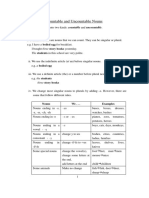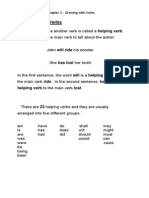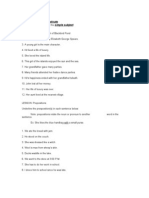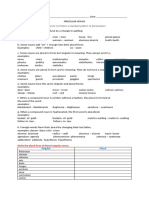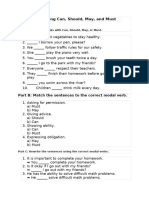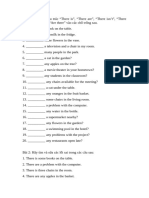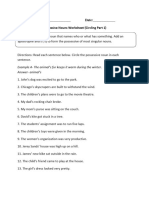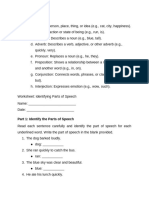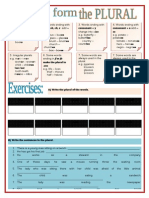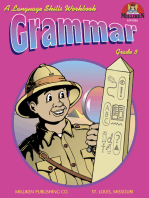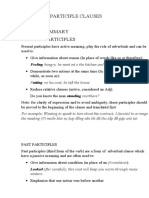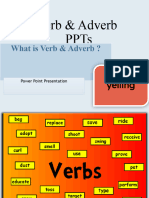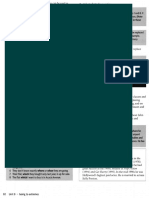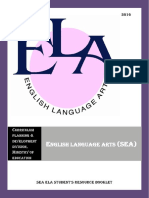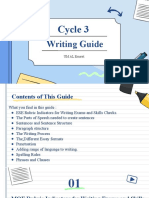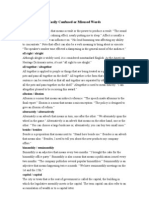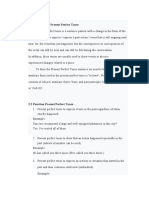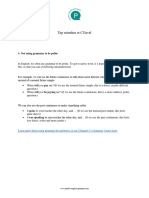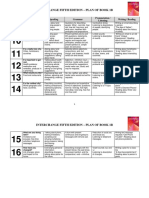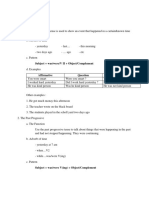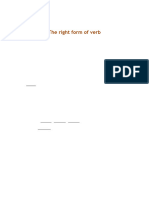Nouns - Singular & Plural
Nouns - Singular & Plural
Uploaded by
Fanny NgCopyright:
Available Formats
Nouns - Singular & Plural
Nouns - Singular & Plural
Uploaded by
Fanny NgOriginal Description:
Original Title
Copyright
Available Formats
Share this document
Did you find this document useful?
Is this content inappropriate?
Copyright:
Available Formats
Nouns - Singular & Plural
Nouns - Singular & Plural
Uploaded by
Fanny NgCopyright:
Available Formats
Nouns - Singular & Plural
A noun is the name of a person, animal, place or thing.
Nouns can be expressed in singular or plural forms.
e.g. this flower (singular)
these flowers (plural)
that girl (singular)
those girls (plural)
a) The plural form of a noun can be formed by:
i) adding "s"
e.g. advertisement + s = advertisements
glove + s = gloves
book + s = books
ii) adding "es"
e.g. ash + es = ashes
box + es = boxes
iii) changing "-y" that follows a consonant into "-ies"
e.g. apology + ies = apologies
baby + ies = babies
city + ies = cities
iv) changing "-f" or "-fe" into "-ves"
e.g. half + ves = halves
leaf + ves = leaves
life + ves = lives
v) changing the vowels in the nouns
e.g. bacterium = bacteria
foot = feet
man = men
vi) adding "-e" or "-en"
e.g. child + ren = children
larva + e = larvae
b) Some mnouns are always expressed in the singular form.
c) Some nouns are always expressed in the plural form.
d) Compound nouns are also expressed in singular and plural forms.
Exercise 1
children blouse handbag boys postman
lady bone rabbit fish bath
1. The________ handed me a letter.
2. The dog held a________ in its mouth.
3. _________ love to watch cartoons on television.
4. Those__________ were kicking a ball in the rain.
5. Mother was cleaning a _______ for dinner.
6. Sulin took a __________ and put on a clean __________.
7. A__________ is a furry white animal.
8. The well-dressed_________ is carrying an expensive__________.
Exercise 2
Underline the nouns in the following sentences.
1. The little girl is licking her fingers.
2. The moon shone brightly in the sky.
3. That angry woman shouted at the shopkeeper.
4. I kept the money and the note in my wallet.
5. Many ants were crawling on the floor and up the pillar.
6. There was plenty of food on the table.
7. The monkey climbed up the tree and plucked a coconut.
8. She ate an ice-cream and stained her frock.
9. The clumsy man tripped over a box and fell on his face.
10. Insects are six-legged creatures.
Exercise 3
Fill in the blank with the plural form of the word in brackets.
1. The__________(policeman) looked smart in their clean and crisp uniforms.
2. The__________(child) were warned not to play near the construction site.
3. About a hundred__________(sheep) were grazing on the hillside.
4. Mother put five_____________(tablespoonful) of sugar into the pot.
5. The________(thief) were caught and handed over to the police.
6. There are_________(fungus) growing on the trunk of the fallen tree.
7. She kept the __________(glass) in the cabinet.
8. ___________(library) usually keep a variety of books.
9. Those_________(mango) were sweet and juicy.
10. The __________(princess) were waited upon by their servants.
Nouns - Countable & Uncountable
Nouns which can be counted are called countable nouns.
e.g. men, elephants, marbles
Nouns which cannot be counted are called uncountable nouns.
e.g. rice, milk, sand
Words which are used with countable nouns:
a, an, few, many, several, a large(or small) number of
e.g. a flower an umbrella a large number of trees
Words which are used with uncountable nouns:
a little, much, a large(or small) amount of
e.g. a little dust much salt a large amount of flour
Words which can be used with both countable and uncountable nouns:
some, any, plenty of, a lot of
With countable nouns:
e.g. some apples any chairs plenty of books
With uncountable nouns:
e.g. some soil any electricity plenty of soil
Exercise 1
legs umbrella books eagle eggs
bottles buttons skirt plates seats
1. She put all the ten_________ into a basket.
2. That spider has eight hairy____________.
3. An__________ is very useful when it rains.
4. There are several empty_________ in the bus.
5. There are plenty of__________ of lemonade in the store-room.
6. This library has a lot of new_____________.
7. There is a box full of_________ on top of the sewing machine.
8. She packed several__________ and cups into the picnic basket.
9. Mother went to the department store and bought a_________ and a pair of
shoes.
10. John saw an_________ soaring high in the sky.
Exercise 2
Choose the right answer. The underline it.
1. I have (a few, a little) money in my wallet.
2. Is there (any, some) stew left in the pot?
3. No, there isn't (some, any) stew left.
4. I have (any, some) books which I would like to lend you.
5. Timothy does not have as (many, much) marbles as Brian.
6. There are ( a great deal of, a lot of) books in the library but not (many,
much) magazines.
7. Give me (a little, a few) more minutes to finish my homework.
8. Joel has a large (amount, number) of stickers in his album.
9. She poured a small (amount, number) of milk into the glass.
10. Don't put so (many, much) eggs into one basket.
11. There are (a little, a few) more biscuits in that container.
12. Do you need (some, any) help?
Exercise 3
Rewrite these sentences by replacing the underlined words in each sentence
with "not many" or "not much".
1. There is a lot of jam in the jar.
______________________________________________________________
2. There are several children in that playground.
______________________________________________________________
3. There are plenty of mango trees in Mr Chen's orchard.
______________________________________________________________
4. There was plenty of sand by the roadside.
______________________________________________________________
Proper Nouns
A proper noun is a name given to a person, animal, thing or place. It always
begins with a capital letter.
Possessive Nouns
A noun that shows possession is called a possessive noun.
e.g. The boy's shoes are expensive.
The policemen's uniforms are smart-looking.
Those ladies' dresses are beautiful.
The words boy's, policemen's and ladies' are called possessive nouns since
they show possession.
e.g. The wheels of the bicycle.
The cover of the pen.
The zip of the handbag.
The nouns bicycle, pen and handbag are non-living. The words "of the" are
used with such nouns to show possession.
Possessive nouns can therefore be formed in the following ways:-
a) By adding an apostrophe s('s) to singular and plural nouns which do not
end in s.
e.g. 1) This is the elephant's trunk.
2) That is the girl's toy.
3) Those are the women's watches.
4) These are the children's toys.
b) By adding an apostrophe(') to plural nouns which end in s.
e.g. 1) Tigers' teeth are very sharp.
2) The girls' dresses are soiled.
c) By using "of the" with things that are non-living.
e.g. 1) The tyres of the car are punctured.
2) A leg of the table is broken.
The apostrophe is used only when referring to persons, animals, measure or
time.
e.g. person (This is Jennifer's ring.)
animal (It is the squirrel's tail.)
measure (We shall meet in an hour's time.)
time (Next week's appointment has been cancelled.)
Exercise 1
Rewrite the sentences by using the apostrophe.
1. The garden of that old man is neat.
______________________________________________________________
2. The flowers of the plants are beautiful.
______________________________________________________________
3. The shoes of this child are muddy.
______________________________________________________________
4. The fur of the cat is soft.
______________________________________________________________
5. The legs of those boys are injured.
______________________________________________________________
6. The hair of that girl is glossy.
______________________________________________________________
7. The debate of next Thursday is postponed.
______________________________________________________________
8. Her allowance of one month was forfeited.
______________________________________________________________
9. The knives of the butchers are sharp.
______________________________________________________________
10. The dresses of the ladies are expensive.
______________________________________________________________
Exercise 2
Rewrite these expressions making them plural.
1. The boy's shirt
______________________________________________________________
2. The mouse's tail
______________________________________________________________
3. The man's hand
______________________________________________________________
4. The grocer's shop
______________________________________________________________
5. The lady's purse
______________________________________________________________
Forms of the Verb
A verb can take four forms, namely,
a) the Simple Present Tense
b) the Simple Past Tense
c) the Present Participle
d) the Past Participle
For examples, the verb "eat" can be used in the following ways:-
a) I eat a slice of bread every morning.
b) I ate a slice of bread yesterday morning.
c) I am eating a slice of bread now.
d) I have eaten a slice of bread.
Helping words "am" and "have" is used.Other helping words are "is" and "has".
Exercise 1
Write down four other forms of the verb in each these sentences.
1. Everyday : He takes his daughter to school.
Now : __________________________________________________
Yesterday : __________________________________________________
Already : __________________________________________________
Tomorrow : __________________________________________________
2. Everyday : She washes the clothes.
Now : __________________________________________________
Yesterday : __________________________________________________
Already : __________________________________________________
Tomorrow : __________________________________________________
3. Everyday : Tommy feeds his cat with fish.
Now : __________________________________________________
Yesterday : __________________________________________________
Already : __________________________________________________
Tomorrow : __________________________________________________
4. Everyday : Jennifer helps to water the plants in the garden.
Now : __________________________________________________
Yesterday : __________________________________________________
Already : __________________________________________________
Tomorrow : __________________________________________________
5. Everyday : He writes a letter to his wife.
Now : __________________________________________________
Yesterday : __________________________________________________
Already : __________________________________________________
Tomorrow : __________________________________________________
Exercise 2
Fill in the blanks.
1. The students who___________(take) part in the debate spoke very well.
2. She________ (be) with me yesterday.
3. He always _________(forget) to close the window.
4. They_________ (go) home by bus every day.
5. It is eight years since she ___________(see) him.
6. She____________(leave) in a hurry as she did not want to miss the train.
7. I__________(wash) my hair on alternate days.
8. They_________(visit) us two days ago.
9. This dog ___________(wag) its tail whenever it sees me.
10. The moon ________(get) its light from the sun.
11. We__________(wait) for her until it rained.
12. My father __________(polish) his car once a month.
13. She_________(perform) very well at the concert last night.
14. My aunt always ____________(make) delicious pineapple tarts.
15. The farmer_________(plough) the field last month.
16. She is_________(argue) with her sister.
17. They have__________ (go) to watch a movie.
18. We were________(take) a stroll in the park.
19. She has already __________(write) a reply to your letter.
20. I am __________(meet) him for lunch.
21. They are ___________ (train) hard for the football match.
22. Who has ____________(take) my book?
23. This song was __________ (sing) by Michael Jackson.
24. He was ________(shiver) with cold.
25. Have you _________( split) the piece of log in two?
26. The wire fencing was ___________(cut) with a pair of pliers.
27. She is _________(teach) her nice how to swim.
28. Have you__________(swim) across this river before?
29. The baby is __________(sleep) soundly now.
30. The jewels were ___________(steal) by an armed robber.
The Simple Present Tense
You might also like
- In G4 EngDocument147 pagesIn G4 EngMratt ZoroNo ratings yet
- Tall Small Pretty Fabulous Useful BigDocument2 pagesTall Small Pretty Fabulous Useful BigMarie Nhel Valencia AlanguilanNo ratings yet
- Countable and Uncountable Nouns Exercises Answers PDFDocument6 pagesCountable and Uncountable Nouns Exercises Answers PDFMark AdelNo ratings yet
- Review Week 1Document10 pagesReview Week 1duyenngoc1310No ratings yet
- TesisDocument13 pagesTesisHugo Alberto Gonzalez OrtizNo ratings yet
- EnglishDocument65 pagesEnglishnitin vermaNo ratings yet
- Eslprintables 2011112472619624Document4 pagesEslprintables 2011112472619624Gizem Papatya UğurdilNo ratings yet
- New Microsoft Office Word DocumentDocument3 pagesNew Microsoft Office Word DocumentRoxana BalcescuNo ratings yet
- Test Initial Cu Barem 7Document3 pagesTest Initial Cu Barem 7Florina RaduNo ratings yet
- 3.12 Helping VerbsDocument8 pages3.12 Helping VerbsTimothy AngelesNo ratings yet
- English ExamDocument7 pagesEnglish ExamIshy CustodioNo ratings yet
- Irregular Nouns WorksheetDocument4 pagesIrregular Nouns Worksheet109927No ratings yet
- English GrEDocument34 pagesEnglish GrESutapa Pawar100% (2)
- ConjunctionsDocument4 pagesConjunctionsSophia LimNo ratings yet
- GrammarDocument6 pagesGrammarchashmanmuneerNo ratings yet
- English Exam 3rd Summative TestDocument15 pagesEnglish Exam 3rd Summative TestAmapola Zane PalamosNo ratings yet
- January ExamDocument7 pagesJanuary ExamZirram MijNo ratings yet
- Worksheet English Class 3rdDocument11 pagesWorksheet English Class 3rdmauryapiaeNo ratings yet
- Some Any Much ManyDocument6 pagesSome Any Much ManyHoang DuongNo ratings yet
- 2nd Grade EnglishFinalprintDocument120 pages2nd Grade EnglishFinalprintn5347pNo ratings yet
- Just For FunDocument20 pagesJust For FunIvygrace Ampodia-SanicoNo ratings yet
- Regular and Irregular Plural Nouns inDocument7 pagesRegular and Irregular Plural Nouns inUyen VoNo ratings yet
- P.1 English Notes Term - 1 2021Document28 pagesP.1 English Notes Term - 1 2021Agnes SacherNo ratings yet
- Countable and Uncountable NounsDocument6 pagesCountable and Uncountable NounsggwjshtcgulazkwkecNo ratings yet
- New Microsoft Word DocumentDocument10 pagesNew Microsoft Word DocumentAlpa ShindeNo ratings yet
- Worksheets Reg 1Document24 pagesWorksheets Reg 1Andres DiazNo ratings yet
- A1.1 Unit2Document22 pagesA1.1 Unit2Leonardo AngamarcaNo ratings yet
- 4th Test UnitDocument2 pages4th Test UnitTatiana CruduNo ratings yet
- 1 Write The Plural Form For Each of These Singular Nouns. 2 Choose The Correct Answer. 1 All My Friends Are GoodDocument2 pages1 Write The Plural Form For Each of These Singular Nouns. 2 Choose The Correct Answer. 1 All My Friends Are GoodValentina CastilloNo ratings yet
- Grammar Unit 1 (Part 1)Document3 pagesGrammar Unit 1 (Part 1)My Trần Thị DiễmNo ratings yet
- Nouns Singular and Plural Grammar Drills Grammar Guides Oneonone Activities 113067Document2 pagesNouns Singular and Plural Grammar Drills Grammar Guides Oneonone Activities 113067istichoma ria ulfaNo ratings yet
- Ole Locala 2023 Cls 7 Subiect Varianta 1Document4 pagesOle Locala 2023 Cls 7 Subiect Varianta 1Anca IonNo ratings yet
- Delhi Public School, Srinagar: Revision Worksheet English Class Iii Noun DateDocument8 pagesDelhi Public School, Srinagar: Revision Worksheet English Class Iii Noun DateShankar Kumar RoyNo ratings yet
- Latihan GrammarDocument7 pagesLatihan GrammarSuheil AlmawardieNo ratings yet
- CombinepdfDocument7 pagesCombinepdfBala KadirNo ratings yet
- Possessive NounsDocument6 pagesPossessive Nounssalinamohdlatif739No ratings yet
- 7L1 VocabularyDocument2 pages7L1 VocabularypetronicaNo ratings yet
- Review V Vi GradersDocument33 pagesReview V Vi Gradersdarmibarrera7No ratings yet
- Easy GrammarDocument6 pagesEasy GrammarMrs PoovanNo ratings yet
- tổng ônDocument5 pagestổng ônbeanne2312No ratings yet
- Possessive Nouns in NewDocument5 pagesPossessive Nouns in NewUyen VoNo ratings yet
- 2nd GradingDocument11 pages2nd GradingMarjorie ManlosaNo ratings yet
- Grammar TestDocument9 pagesGrammar Testnoorazniaziz100% (1)
- Parts of SpeechDocument9 pagesParts of SpeechVũ Thanh GiangNo ratings yet
- LVL1 U2Document23 pagesLVL1 U2YOLANDA HERNANDEZ ESCARCEGANo ratings yet
- S, SS, SH, CH, X Add - Es EsDocument2 pagesS, SS, SH, CH, X Add - Es EsRaffie BlueNo ratings yet
- Worksheets For Sem1Document9 pagesWorksheets For Sem1Shery MujosNo ratings yet
- Countable and Uncountable NounsDocument6 pagesCountable and Uncountable NounsOl Oz100% (1)
- Bent Tree 1 - GRAMMAR - MT 1 - TERM 1 - 2022Document9 pagesBent Tree 1 - GRAMMAR - MT 1 - TERM 1 - 2022ruby Javaid21No ratings yet
- Y2 Unit 8 QuizDocument6 pagesY2 Unit 8 QuizKALISWARY A/P PULIANDRAN MoeNo ratings yet
- Games and Puzzles for English as a Second LanguageFrom EverandGames and Puzzles for English as a Second LanguageRating: 5 out of 5 stars5/5 (1)
- LET Reviewer Preboard 2019 English (LOCKED)Document10 pagesLET Reviewer Preboard 2019 English (LOCKED)Art DollosaNo ratings yet
- Truong, Hue T. - 2018 - Listening Level 3. ENG 218 - 2020S - TEXTDocument82 pagesTruong, Hue T. - 2018 - Listening Level 3. ENG 218 - 2020S - TEXTNhật VyNo ratings yet
- English Exercise Book 3 Eso A: Ies Canónigo ManchónDocument36 pagesEnglish Exercise Book 3 Eso A: Ies Canónigo ManchónrobertoquinteiroNo ratings yet
- Topic 25 Relations of Cause, Consequence and PurposeDocument5 pagesTopic 25 Relations of Cause, Consequence and PurposeMiriam Reinoso SánchezNo ratings yet
- Participle Clauses: Feeling Hungry, He Went Int o The Kitchen and Opened The FridgeDocument7 pagesParticiple Clauses: Feeling Hungry, He Went Int o The Kitchen and Opened The FridgeNguyễn Phương ThuýNo ratings yet
- Hy PhonationDocument10 pagesHy PhonationbashingaNo ratings yet
- Practising Sentence VarietyDocument17 pagesPractising Sentence VarietyJenny ChavushNo ratings yet
- Praditya Adinda Summary Notes For The TOEFL Test PDFDocument107 pagesPraditya Adinda Summary Notes For The TOEFL Test PDFMir SylNo ratings yet
- Tenses SummaryDocument2 pagesTenses SummarytintNo ratings yet
- Verb + Adverb PPtsDocument32 pagesVerb + Adverb PPtsArathi KiranNo ratings yet
- DLP - Eng 7 - Lesson 9Document7 pagesDLP - Eng 7 - Lesson 9JudemilNo ratings yet
- Bahan TOEFL DikonversiDocument147 pagesBahan TOEFL DikonversifakhranaNo ratings yet
- Notes On The Unit: Relative Clauses and ParticiplesDocument1 pageNotes On The Unit: Relative Clauses and ParticiplesZeri Iarsyes0% (1)
- List of The Authors Cited in The Book . .. PREFACE Part I: TheoryDocument244 pagesList of The Authors Cited in The Book . .. PREFACE Part I: TheoryНастя СеменчукNo ratings yet
- Parts of Speech VerbsDocument30 pagesParts of Speech VerbsImam YudhoNo ratings yet
- SEA ELA 2016 Students ResourceDocument134 pagesSEA ELA 2016 Students ResourceKashim Ali50% (2)
- Writing GuideDocument86 pagesWriting GuideSedra Mousa Al Samara mousa almokdad Almokdad al samara100% (1)
- Easily Confused or Misused Words: Affect / EffectDocument6 pagesEasily Confused or Misused Words: Affect / Effect林侑萱No ratings yet
- Present Perfect Tense Interrogative Sentence Eleme Grammar Guides - 11526Document5 pagesPresent Perfect Tense Interrogative Sentence Eleme Grammar Guides - 11526Debora AzcurraNo ratings yet
- So That VS Such ThatDocument7 pagesSo That VS Such ThatmaritzaNo ratings yet
- Makalah Present Perfect TenseDocument4 pagesMakalah Present Perfect TenseRavina PutriNo ratings yet
- Perfect English Grammar Top Mistakes at c1 LevelDocument6 pagesPerfect English Grammar Top Mistakes at c1 Levelhthu220022005No ratings yet
- Passive Voice (Si) (1) - 231226 - 101027Document17 pagesPassive Voice (Si) (1) - 231226 - 101027nadeekaebaynadeekaNo ratings yet
- Passive VoiceDocument12 pagesPassive VoiceYUU NAKANONo ratings yet
- Interchange Fifth Edition - Plan of Book 1BDocument2 pagesInterchange Fifth Edition - Plan of Book 1BGabriela AguilarNo ratings yet
- Subject + Was/were/v II + Object/ComplementDocument6 pagesSubject + Was/were/v II + Object/ComplementRini TiaraNo ratings yet
- Group 1. English Syntax. Word Class. B1Document35 pagesGroup 1. English Syntax. Word Class. B1Dina SharaNo ratings yet
- Verb TensesDocument35 pagesVerb TensesGlaiza VillaverNo ratings yet
- Class 13 Right Form of VerbsDocument12 pagesClass 13 Right Form of Verbsعبدالرحمن بن مسعودNo ratings yet
- Ifa 3 - Students Pack Extra ExercisesDocument28 pagesIfa 3 - Students Pack Extra ExercisesSusana Castro Gil0% (1)




